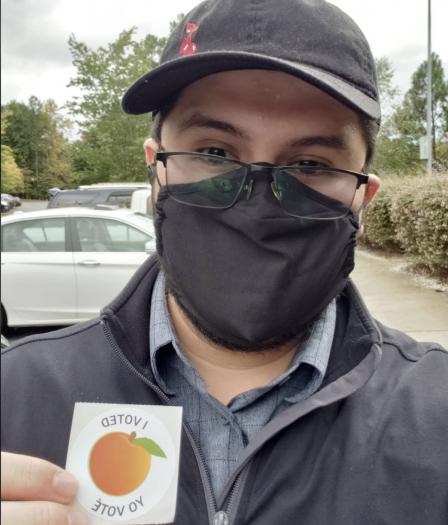Voter Protection Is Environmental Protection

This year has upended our sense of normalcy and this year’s presidential election is no different—during a pandemic and featuring a racist, authoritarian incumbent who’s ready to watch our democracy crumble under his narcissistic motivations. We’ve already seen fake ballot boxes being planted by the Republican party in California and voters standing in line for over five-hours here in Georgia. Republican politicians across the country are frantically trying to stem a tide of democracy that will one day sweep them out of power.
It's no surprise that voter suppression is usually concentrated in communities of color, which has a long and shameful history in this country. Even knowing that, it’s still shocking to see, firsthand, how voter suppression is rampant in communities like Gwinnett County, Georgia, where I live.
Voter intimidation is illegal everywhere, and here in Georgia, long lines are also against the law. Our state has a legal cap of 2,000 voters for any polling place that has experienced significant voter delays. In reality, nine out of 10 precincts are assigned to polling places with more than 2,000 people, and the problem is worse in the precincts with more people of color. The Brennan Center for Justice came out with a study a few months ago showing that Latino voters now wait, on average, 46 percent longer than white voters, and Black voters wait on average 45 percent longer than white voters.
When I went to vote at the Lucky Shoals Park voting location, I had to wait in line, outdoors, for two hours. When it started to rain, we got wet—only a few people were allowed inside at a time. I saw some voters turned away because the Lucky Shoals Park voting location wasn't their correct polling location. Many voters don’t realize that they can only vote in the county where they live.
But in spite of the long, uncomfortable line, I know I was relatively lucky. Many would-be voters are being forced to wait even longer. Worse, they’re being subjected to voter intimidation from Trump supporters who’ve been emboldened by the president himself, like the armed Miami police officer who entered his polling place this week wearing a “Trump 2020” face mask. I talked to one friend of mine who lives in a Republican county and told me she was nervous about going to the polls because she was afraid that a pro-Trump voter would see her Democratic ballot and retaliate. No one should have to thread their way through a hostile Trump rally to cast a ballot—but that’s what’s happening.
According to an analysis of state and local records by Georgia Public Broadcasting and ProPublica, polling locations have been cut statewide by nearly 10 percent even as voter rolls grew by nearly 2 million people.
This election is about more than who will occupy the White House or which party will win the Senate. It’s a test of whether our democracy can still function in spite of the attacks that have only escalated since the Supreme Court gutted the Voting Rights Act in 2013. Can we still use our democratic power as citizens to protect democracy itself?
The coming weeks hold the answer. We must take action to ensure that all communities have equal access to the pillars of our democracy, from equitable participation in elections, to an equal seat at the table in government decision making. All I can say in the meantime is don’t let anyone take away your most precious right (and responsibility) as a citizen. They can make it hard. They can make it uncomfortable. They can even make it frightening. But they can’t make it impossible—not if we’re determined, and four years of Donald Trump have created a huge reservoir of determination.